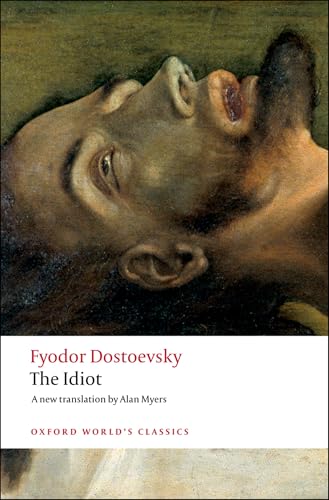The Idiot (Oxford World's Classics)
Fyodor Dostoevsky; Alan Myers; William Leatherbarrow
BOOK REVIEW

The Idiot stands as a monumental triumph of literature, inviting readers to plunge into the turbulent mind of Prince Lev Nikolayevich Myshkin - a character that embodies innocence in a world rife with hypocrisy and moral decay. Fyodor Dostoevsky crafted this masterpiece in 1869, a time when Russia was on the cusp of immense change, both socially and politically. In our contemporary landscape, the echoes of Dostoevsky's exploration of human nature and societal flaws remain shockingly relevant.
Unlike any other protagonist in literary history, Myshkin represents the "holy fool," a concept that deeply resonates with how we perceive sanity and morality in today's chaotic world. He arrives in St. Petersburg, not merely as an outsider but as a mirror reflecting the madness of those around him. The turmoil of 19th-century Russia almost pales in comparison to the inner turmoil that Myshkin experiences as he navigates love, betrayal, and existential doubt.
Readers grapple with the nuanced layers of characters who orbit around Myshkin, each a fascinating representation of societal archetypes: the manipulative Nastasya Filippovna, the ambitious Rogozhin, and the cunning Aglaya Epanchin. The dynamics between them and the Prince pull readers into a web of emotional intensity, leaving you grappling with your own perceptions of morality and the complexities of human behavior.
Many critics argue that Dostoevsky's dense prose can be daunting, creating barriers to accessibility. Yet, therein lies the beauty. Each sentence is a carefully constructed revelation about humanity's essence. The philosophical dialogues beckon you to engage with moral questions that linger long after the final page is turned. This is not a mere read; it is a psychological and philosophical journey, invoking contemplative reflection that is as compelling as it is disquieting.
As you dive deeper, the narrative challenges you, almost daring you to confront the absurdity of decisions made in the name of love or ambition. Myshkin, with his naïveté and purity, sparks a visceral reaction-do you cheer for him or wish for his downfall? The duality of being human is masterfully explored, urging you to question: is ignorance a blessing? Can pure intentions survive in a corrupted world?
Reader testimonies reveal a shared struggle yet profound appreciation. Many laud the intricate character development while others express frustration with Dostoevsky's elaborate subplots. Some find Myshkin's cerebral nature daunting, possibly even frustrating when juxtaposed against the raw emotions of his counterparts. This dichotomy of love and despair is the very heartbeat of the novel, driving readers to confront their own struggles with societal pressures and ethical dilemmas.
Feelings stir as you watch Myshkin's earnestness collide with the artifice surrounding him. The tragic irony is palpable; the place where he seeks acceptance becomes the very ground of his alienation. As you engulf yourself in these pages, you become intimately aware of the broader existential questions Dostoevsky thrusts upon you-are we not all a little mad? How far can kindness go in a world so often shrouded in selfishness?
The rich tapestry of The Idiot doesn't merely rest in its narrative; it stretches through time, influencing writers and thinkers throughout the ages. From the existential musings of Nietzsche to the modern psychological explorations seen in literature today, the threads of Dostoevsky weave a complex dialogue on morality, identity, and the very fabric of society itself. This work is a promise: to confront, to challenge, and ultimately, to transform your understanding of what it means to be human.
In summary, The Idiot is not just a literary piece but a call to arms for introspection. It compels you to immerse yourself within its pages, where you'll find a narrative both tragic and beautiful, evoking empathy and reflection. The experience is nothing short of transformative-one that resonates in the heart long after the last word is read. Don't miss your chance to engage with Dostoevsky's magnum opus; it may just illuminate your path in the labyrinth of life. 🌟
📖 The Idiot (Oxford World's Classics)
✍ by Fyodor Dostoevsky; Alan Myers; William Leatherbarrow
🧾 952 pages
2008
#idiot #oxford #worlds #classics #fyodor #dostoevsky #FyodorDostoevsky #alan #myers #AlanMyers #william #leatherbarrow #WilliamLeatherbarrow